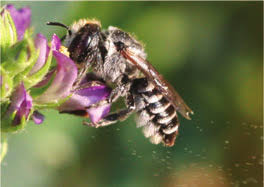Bees are essential to agriculture production with honey bees and bumble bees often taking the pollination spotlight. However, there are other species in the world of pollination such as the alfalfa leafcutting bee (Megachile rotundata). These solitary bees are not only interesting but also incredibly efficient at their job, making them highly valued for the production of certain crops, such as alfalfa, blueberries, and carrots.
Alfalfa Leafcutter Bee
Honey bees and bumble bees live in relatively large
colonies, unlike the alfalfa leafcutting bee (ALCB) which is a solitary
species. Every female bee is a queen, taking care of her offspring with no
workers. The life cycle of the ALCB is well-suited for its role as a
pollinator. In the spring, adult bees emerge from their leaf-lined nests,
having overwintered as pupae. Males typically emerge prior to the females. Once
the females emerge, mating takes place, and the females begin searching for
nesting sites. The ALCB female will seek out pre occurring cavities such as
hollow plant stems or man-made structures. After finding a suitable cavity, the
female ALCB starts cutting leaves to build her nest. The ALCB gets its name
from this unique nesting behavior. The
female bee cuts circular pieces of leaves using her strong jaws. She uses these
leaf pieces to construct cells within the cavity, each containing a single egg
along with a mixture of pollen and nectar. Once a cell is completed, she seals
it with more leaf pieces and moves on to create the next cell. Within the cells, eggs hatch into larvae,
which feed on the stored pollen and nectar. After completing their development,
the larvae pupate within the cells and emerge as adult bees the following
spring. This life cycle, which revolves around the availability of flowers for
nectar and pollen, ensures perfect timing to provide natural pollination. This solitary lifestyle and distinctive
nesting habit make the ALCB a unique and important part of our ecosystem.
Alfalfa leafcutting bees are highly effective pollinators.
They have a different approach to pollination from honey bees and bumble bees,
which carry pollen in their pollen baskets. Alternatively, the ALCB carry
pollen on their hairy abdomen and only need enough pollen to sustain itself and
a few offspring. Under optimal conditions, alfalfa leafcutting bees can
pollinate more plants per minute and can spend more time per day pollinating
then other managed pollinators. Alfalfa leafcutting bees also pollinate a wider
range of flowers than bumble bees and honey bees which makes them excellent
general pollinators.
The ALCB is a remarkable and underappreciated pollinator that plays a crucial role in agriculture. Its efficiency, adaptability, and resilience making it a good option. Alfalfa leafcutting bees are currently under utilized in wild blueberry pollination, although producers in the North East region of new Brunswick have demonstrated good success using ALCBs. Based on this proven track record, perhaps other producers could investigate the viability of alfalfa leafcutter bees for pollination. Further understanding and utilization of these solitary bees, could enhance agricultural productivity by providing another option for pollination.
So next time you enjoy a blueberry, remember a tiny ALCB may have made it all possible!
Written by Gregory Dugas, Seasonal Apiculturist
Connecting with ATTTA Specialists
If you’d like to connect with ATTTA specialists or learn more about our program, you can:
visit our website at https://www.perennia.ca/portfolio-items/honey-bees/
Email abyers@perennia.ca
References
MacKenzie, K., Javorek, S. and Rogers, D., 1997. The alfalfa leafcutting bee, Megachile rotundata Fabr.: An alternative managed pollinator of lowbush blueberry. Acta Horticulturae, pp.87-90.
Stubbs, C.S. and Drummond, F.A., 1996, August. Pollination of wild lowbush blueberry, Vaccinium angustifolium by the alfalfa leafcutting bee, Megachile rotundata. In VI International Symposium on Vaccinium Culture 446 (pp. 189-196).
Stubbs, C. S., & Drummond, F. A. 1997. Management of the Alfalfa Leafcutting Bee, Megachile rotundata (Hymenoptera: Megachilidae), for Pollination of Wild Lowbush Blueberry. Journal of the Kansas Entomological Society, 70(2), 81–93. http://www.jstor.org/stable/25085759
Pitts-Singer, T.L. and Cane, J.H., 2011. The alfalfa leafcutting
bee, Megachile rotundata: the world's most intensively managed solitary bee. Annual
review of entomology, 56(1), pp.221-237.

